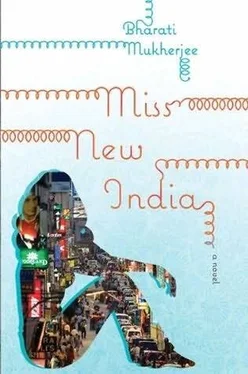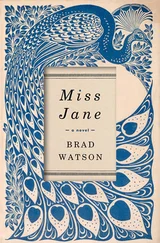Over lunch, which invariably consisted of rice-clogged mulligatawny soup, a main course of insipid mutton stew, or goat-meat shepherd's pie, and a dessert-Asoke's culinary skills having been honed as an adolescent in that very house and not been challenged since-Anjali did her best to glean information on work-site etiquette at call centers. For instance, Husseina and Tookie lost their temper if anyone addressed them as call-center agents. They were "customer-support service specialists," and don't you dare forget it. She also squirreled away information on the American mentality and economy. From Tookie's insurance perspective, every car on the American road must be a dented wreck and all drivers were the walking wounded. In an exaggerated American accent Tookie would exclaim, "My job's a bitch! I'm burned out, man!" To Husseina, all Americans were heedless borrowers mired in debt, their home ownership hanging by a thread. From a distance, Husseina said, America might seem enticing, but viewed up close it was a scary place to live. Somehow Tookie always managed to steer the dining-table chatter back to nasty gossip about their landlady.
"You can't trust anything these Anglo-Indians say. If Minnie's precious viceroy was ever in this house, you know Maxie would have locked her away in the servants' shed." Tookie, like Minnie, was not one to disguise her prejudices, except when she thought Minnie was eavesdropping. Anjali drew a deft lesson from Tookie's version of Mrs. Bagehot's life: obstacles are steppingstones. The unsentimental stay smart. They trade up.
For her part, Anjali offered up morsels of a mythical Gauripur cast in a lurid, Bollywoodish light. Ali the gay servant was a big hit with Tookie. In Anjali's telling, she passed her old saris along to him. The comedy of Hindu marriage arrangements-she was careful to omit her horrible car ride with Subodh Mitra-was a winner. Rabi Chatterjee was transformed into an old school friend, maybe the suitor she was destined to marry. She fabricated all this in English because English was the only language the Bagehot House boarders had in common. Besides, English was the language of fantasy. Hindi and Bangla brought only dreary reality.
For the time being at least, Anjali's obstacles were manageable money troubles. She had depleted her stash from Peter Champion (which she now told herself was a merit scholarship and not a loan). To save on expenses, Anjali began to dip into other tenants' bottles of shampoo, squeeze swirls of their toothpaste onto her old brush, scoop dollops of their expensive face creams from squat little jars, and squirt imported cologne from frosted-glass flasks. Gauripur's Anjali had been too timid to experiment with expensive toiletries, and Gauripur's Angie too proud to stoop to stealing. Bangalore's Anjali, a creature of fantasy, considered herself a wily survivor, leveling an uneven playing field.
Besides, Anjali rationalized, Tookie and Husseina could afford to be stolen from. Not that they bragged about their salaries, but they huddled over which make of motorized scooter they should buy, which area of the city made the most sense for investing in a condo, and which banks were courting them most aggressively with offers of low-interest mortgages and loans. They spoke often of "the bottom line," and "long-term interests." Tookie's paycheck had to be astronomical, since she was a "team leader" in charge of ten or twelve "freshers." What must a constant cash flow be like? She vowed to get it together enough to call Usha Desai's number again. Tomorrow, or the day after.
***
ONE AFTERNOON, WITH all three of her fellow boarders gone to work, Minnie asleep after lunch, and Asoke off to visit the outbuilding squatters, Anjali did some incautious snooping around in the closed but unlocked ballroom, billiards room, conservatory, reception hall, smoking room, and the three ground-floor bedroom suites with attached bathrooms and dressing rooms. The ballroom floor tilted at such an upward angle that she had to catch her breath to simply walk across it. The dressing rooms were twice the size of the room in which she and her mother used to sleep. Two sets of curtains, one thick and one sheer, hung from a velvet-covered pelmet above each window. Sparrows had nested in the sconces and chandeliers, and no one had removed the twigs and twine. Rats had chewed through the brocade upholstery of settees and gnawed on the heavy wooden chaises longues. Geckos darted up and down cracked statues of cherubs.
She was about to sneak out of the ballroom when a row of photographs along the far wall drew her attention. Unlike the usual commissioned portraits of vanished officers with their banana-skin helmets, these were wide, black-and-white landscapes, seemingly military scenes, framed in pewter. As she drew closer, she began to feel sick. Sari-clad bodies lay strewn along a riverbank. The faces were young, no older than she was. Bodies of Sikhs-you could identify them by their turbans-lay stacked like firewood, and walking among the bodies were uniformed British soldiers, grinning broadly. One had his foot on the head of a dead Sikh, striking the pose of the Great White Hunter. Maybe he was the young Maxfield Bagehot. She hoped he was. If so, all actions and opinions of Maxie and Minnie were unforgivable and all transgressions by Bagehot House boarders heroic. Another painting featured a distant row of hanged men, Sikhs with their hair chopped off, hanging by their turbans, silhouetted against the setting sun. Bagehot House was a museum of horrors.
She felt herself swelling with rage, then venom. There had to be a reckoning. She wondered if other Bagehot Girls over the years had taken the same secret tour, and how many "dumps" resulted from their quiet acts of deliberate spite. She missed Peter Champion-he could have explained these photos. Maybe she was the first since Peter to invade this warehouse, to touch the objects and feel the blunt insult of history.
She was tall, and icy. Nothing could touch her. If Minnie had been standing at the door, about to invoke Bagehot House rules, Anjali would have pushed her down and walked over her bones. She slipped a silver goblet under her sweater. In school, she'd never really warmed to the history-book chapters devoted to India's "heroic freedom fighters," and the exalted statues of "martyrs" to Indian independence had left her cold. There were families in Gauripur even today living off the glory of their great-grandparents' arrests and jailings. Now three old pictures had driven home an appreciation she'd never felt.
I am Indian, she thought. I'm Indian in ways no one else in this house is Indian, except maybe poor little Sunita Sampath. I have no roots anywhere but in India. My ancestors were hated and persecuted by everyone but themselves. I understand Sonali-di, even Baba. Finally, she had a test for authenticity: Which side of this picture are you on? Is your foot on my head, are you a hanged fighter, or were you laughing at the sight of men dangling by their turbans and women's bodies clogging the riverbanks? Everyone in my life has tried to change me, make me want something alien, and make me ashamed that I might not be good enough. Why should I want to change my name and my accent, why should I plead for a chance to be allowed to take calls from people who've spent too much money or driven their cars into a ditch?
She sauntered back to her bare cubicle in a better mood. At least now she knew she didn't have to be cowering and grateful. Minnie wasn't just the past-she was that thing the newspaper column had described; she was Chinatown, she was the bones under the building boom. Bagehot House was considered a respectable address, a first stop for young working girls. Bagehot House carried its own recommendation. Minnie was admired for running a no-nonsense boarding house that was good training for the corporate world, but there was nothing admirable about it. Anjali, who'd looked on the British period as a long comic opera, felt a sudden connection to all the Indian dead, and the indignities they suffered. She saw her parents still cowering and still recovering from the scars of colonialism and the dazzling new Bangalore as a city of total amnesia. And it was all a lie. House rules did not apply, not when dispensed from a Minnie Bagehot to a young woman like Anjali Bose. She wrapped the silver goblet in a T-shirt and stuffed it inside her Samsonite.
Читать дальше












